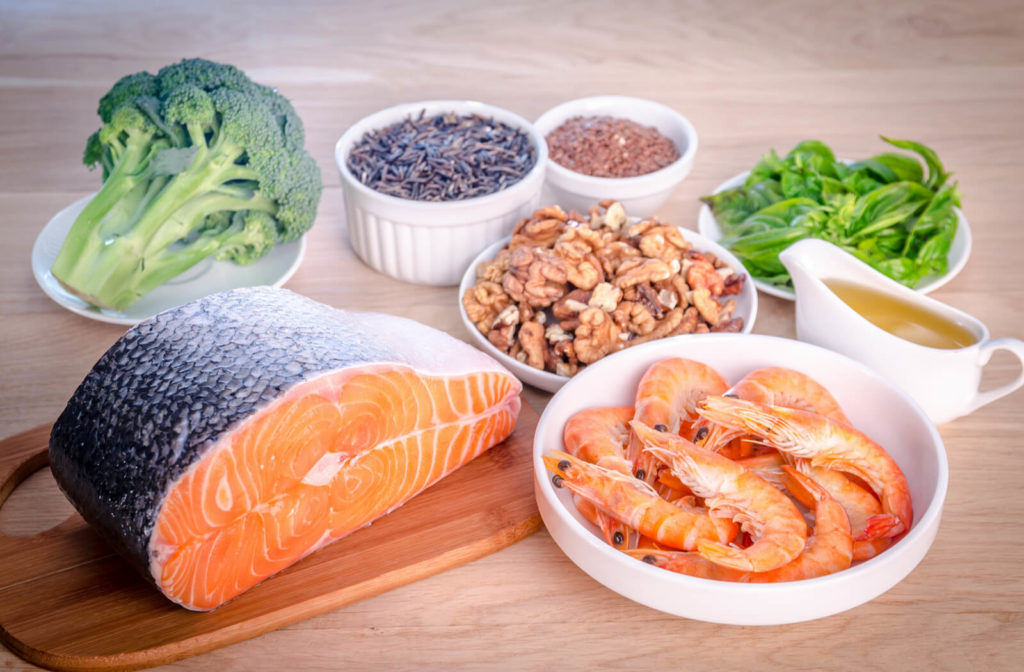A Healthy Diet for Healthy Sight
Nutrition is essential for supporting your eye health and vision. There are countless benefits to adding specific vitamins, minerals, and nutrients into your diet. Maintaining nutrition can help prevent eye disease and reduce symptoms of dry eye.
While a well-balanced diet can benefit your whole body health, some vitamins and nutrients are particularly notable for eye health and vision. But how do you know where to start? Read on to learn about 5 vitamins and supplements that benefit your eyes.
1. Omega-3 Fatty Acids
Adding omega-3 fatty acids is a natural way to support tear production and help treat dry eye. While temporary dry eye can be irritating, chronic or severe dry eye can cause corneal scarring and impair vision. Dry eye also increases the risk of infection, as the tear film helps keep the eye’s surface clean and nourished.
Omega-3 fatty acids can lower the risk of dry eye by 17%. In addition, omega-3s can reduce eye inflammation and promote meibomian gland production, responsible for the oily tear layer (reducing tear evaporation).
The cell membranes of your retina contain a high concentration of omega-3, supporting cell formation in the eye. In addition, omega-3 has anti-inflammatory properties, which can help prevent eye diseases, including age-related macular degeneration (AMD) and diabetic retinopathy (DR).
Cold-water fish are a significant source of omega-3 fatty acids. Some of the best fish for omega-3 fatty acids are:
- Cod
- Herring
- Menhaden
- Salmon
- Sardines
- Tuna
Many supplements for omega-3 use fish oil, which can sometimes give them a fishy taste. If you consider the taste of fish or fish oil unappealing, some seeds high in omega-3 include:
- Chia Seeds
- Flax seeds
- Hemp seeds
2. Vitamin A
Vitamin A can benefit vision in multiple ways. It helps maintain a clear cornea (transparent front surface of the eye), allowing light to enter the eye correctly. Vitamin A is also a component of rhodopsin, a protein found in photoreceptors cells (rods), allowing vision in low light conditions.
While omega-3 might be the most recommended nutrient for dry eye, diets rich in vitamin A can also improve tear quality. Additionally, diets high in vitamin A also lower the risk for age-related macular degeneration (AMD) and cataracts.
Sweet potato is a significant vitamin A source, containing more than 200% of the recommended daily dose. Sweet potatoes also have additional health benefits, mainly due to antioxidants.
Some vitamin A foods include:
- Beef or lamb liver
- Bell peppers
- Carrots
- Leafy green vegetables
- Mango
- Pumpkins
There are also many supplements available with Vitamin A. When possible, try taking vitamin A supplements with healthy fat (such as avocado), as it absorbs better.
3. Lutein & Zeaxanthin
Lutein and zeaxanthin are carotenoids produced by plants. They give fruits and vegetables a yellow or reddish hue. However, the chlorophyll in some vegetables alters the colouring, resulting in dark green.
Lutein and zeaxanthin antioxidants are recommended by the Canadian Association of Optometrists (CAO) to help maintain sharp vision. The carotenoids (in the macula and retina) also help filter blue light to prevent damage.
They can also help prevent multiple eye problems, including cataracts, UV damage, and dry eye. Lutein can also help to slow the progression of macular degeneration, which can lead to vision impairment and blindness.
Foods that contain lutein and zeaxanthin include:
- Broccoli
- Egg yolk
- Kale
- Kiwi
- Parsley
- Red peppers
4. Vitamin C
Vitamin C is a powerful antioxidant. Antioxidants fight free radicals, unstable molecules that can harm cells. Diets rich in vitamin C help maintain clear vision and support the tear film by improving lubrication and production.
In addition, vitamin C is necessary to produce collagen, a structural protein that supports bone, skin, connective tissue, and tendons. In the eye, the cornea and sclera (front of the eye) contain high amounts of collagen.
Supporting collagen in the eye can reduce the risk of developing cataracts and slow the progression of age-related macular degeneration.
Vitamin C is found in various vegetables, particularly citrus fruits. For example, kiwi is high in vitamin C. According to the Canadian Association of Optometrists, kiwi is the top eye food in the fruit category. Some other natural sources of vitamin C include:
- Acerola cherries
- Cantaloup
- Chilli peppers
- Guavas
- Parsley
- Rose hips
Vitamin C is water-soluble. You can consume vitamin C supplements on an empty stomach or with a drink of your choice.
5. Vitamin E
Vitamin E is a fat-soluble vitamin with many health benefits. The vitamin has been used for decades for skin care as taking vitamin E can improve healing time. Other benefits include boosting the immune system and reducing the risk of blood clots.
The most notable benefit for eye health is vitamin E’s role as an antioxidant. Diets high in vitamin E can help reduce oxidative stress, preventing eye disease. In particular, some studies suggest vitamin E can lower the risk of developing cataracts and age-related macular degeneration (AMD). AREDS, a supplement for treating AMD, contains 400 IU of vitamin E.
Some foods rich in vitamin E include:
- Almonds
- Broccoli
- Kiwi
- Mango
- Spinach
- Tomato
Vitamin E, like vitamin A, is fat-soluble. So when taking it in supplement form, it’s best to add healthy fat.
Want More Nutrition Tips?
While we’ve provided 5 vitamins that can benefit your eye health, there are many more! Adding omega-3, vitamin A, vitamin C, vitamin E, lutein, and zeaxanthin into your diet is a good start. Talk to your eye care team when you want more eye nutrition tips.Book an appointment at River Heights Eye Care to discuss nutrition and healthy lifestyle habits. We can personalize recommendations for your unique eye health needs.


